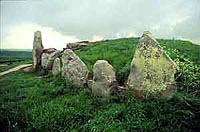22. BEOWULF'S BARROW

In the passage below the poet narrates Beowulf's funeral. He gives
it great significance. Beowulf himself receives two ceremonies: a definitely
pagan cremation, and a burial in grave mound that is ambiguously Christian
or pagan. The lament is common in both pagan and Christian funerals.
Wiglaf's called for pyre wood to be brought to Beowulf's final resting
place, pointing out that Beowulf, who often endured iron showers of enemy
arrows, should now be endured by fire. Wiglaf chose seven thanes to accompany
him inside the cavern, where they appropriated the unguarded treasure,
dragged the fire dragon out, and pushed his dead body over a cliff into
the sea.
Beowulf's body was loaded on a wagon and transported to the Whale's Headland.
On the brow of the cliff the Geats built a splendid pyre, hung with helmets
and shields, and as Beowulf requested, they laid their lord's body on
the pyre. They ignited the greatest of funeral fires, wood smoke mounted
up darkly above the flames, and soon the body of Beowulf was burned, even
the heart. Round the pyre rode Beowulf's thanes mourning their fallen
lord; they chanted their dirges and proclaimed the King's virtue and fame.
There was much wailing and mourning and singing of sad songs. A Geatish
woman with braided hair lamented the loss of her King. A great and noble
King had fallen.
"A huge heap of wood was ready"
A huge heap of wood was ready,
Hung around with helmets, and battle
Shields, and shining mail shirts, all
As Beowulf had asked. The bearers brought
Their belovèd lord, their glorious king,
And weeping laid him high on the wood.
Then the warriors began to kindle (1) that greatest
Of funeral fires; smoke rose
Above the flames, black and thick, (2)
And while the wind blew and the fire
Roared they wept, and Beowulf's body
Crumbled (3) and was gone. The Geats stayed,
Moaning their sorrow, lamenting their lord:
A gnarled old (4) woman, hair wound
Tight and gray on her head, groaned (5)
A song of misery, of infinite sadness
And days of mourning, of fear and sorrow
To come, slaughter (6) and terror and captivity.
And Heaven swallowed (7) the billowing (8) smoke.
Then the Geats built the tower,(9) as Beowulf
Had asked, strong and tall, so sailors
Could find it from far and wide; working
For ten long days they made his monument,
Sealed his ashes in walls as straight
And high as wise and willing hands
Could raise them. And the riches he and Wiglaf
Had won from the dragon, rings, necklaces,
Ancient, hammered (10) armor--all
The treasures they'd taken were left there, too,
Silver and Jewels buried in the sandy
Ground, back in the earth, again
Abd forever hidden and useless to men.
And then twelve of the bravest Geats
Rode their horses around the tower,
Telling their sorrow, telling stories 3
Of their dead king and his greatness, his glory,
Praising him for heroic deeds, for a life
As noble as his name. So should all men
Raise up words for their lords, warm
With love, when their shield and protector leaves 4
His body behind, sends his soul
On high. And so Beowulf's followers
Rode, mourning their belovèd leader,
Crying that no better king had ever
Lived, no prince so mild, no man
So open to his people, so deserving of praise.
(Beowulf,Lines 3137-3182, N. A. L., Translated by Burton Raffel.)
Notes:
1. kindle:
set fire to, kindle.
2. thick: dense.
3. crumbled: broke into small pieces.
4. gnarled: aged, curved.
5. groaned: moaned, sighed.
6. slaughter: massacre.
7. swallowed: ate.
8. billowing: building up, rising in waves.
9. tower: tower-barrow; a mound of earth constructed to cover a
burial.
10. hammered: fashioned, modelled, shaped with a hammer.
DISCOVERING MEANINGS:"WERGILD".
According to the code of Beowulf's historical era and society, a faithful
retainer received many generous gifts as a reward for his loyalty and
courage. Consequently, if a thane's king were killed, the thane was duty-bound
to avenge the murder. Likewise, a relative was expected to avenge the
murder of a kinsman by killing a member of the tribe or family of the
murderer. With the introduction of wergild,each man had a price placed
on him in accordance with his position. The higher the price, the less
chance of his being murdered. By the same token, paying a price after
a person's death often put an end to a feud, particularly since the kinsman
of the murdered man wouldn't lose face by accepting the appropriate wergild.
Thus wergild was a sum of "worth money"- the "price"
of a man - based on the concept of recirpocity.
|

